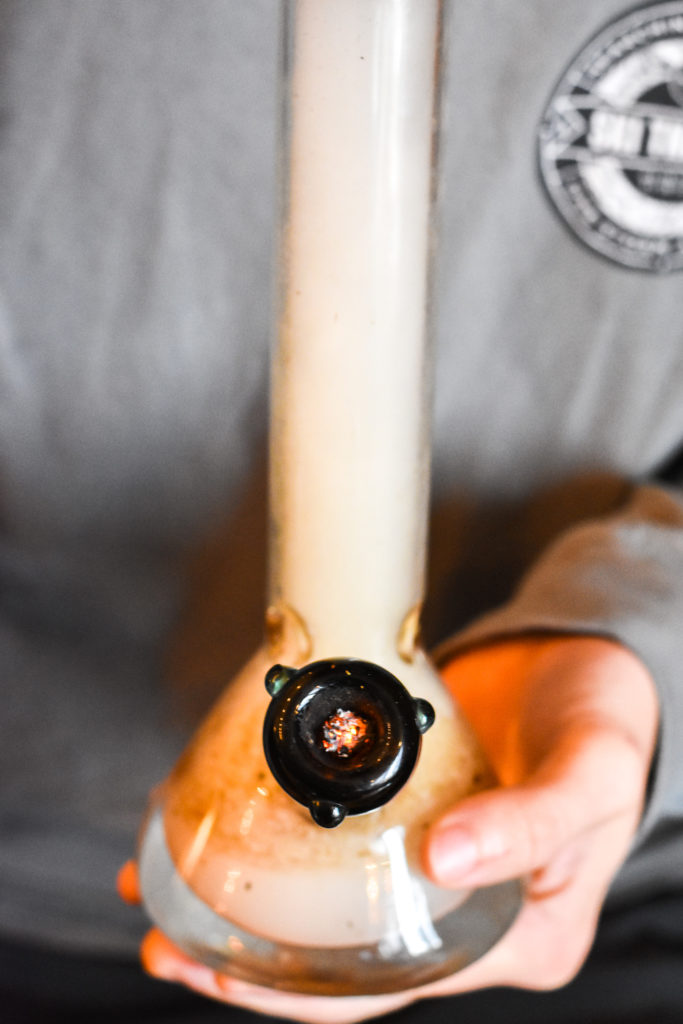
By Matthew Pramas
Managing Editor
Xavier Collins ’21* was no stranger to smoking cannabis or vaping nicotine on a daily basis when doctors diagnosed him with cannabinoid hyperemesis syndrome (CHS), a newly discovered illness associated with habitual cannabis usage.
Collins’s first CHS episode happened as a Sophomore, a year into smoking daly, had him throwing up for four hours straight. “It was the most pain I’d ever been in,” Collins said.
The rise in reported CHS cases comes at a time of declining cannabis stigma but also the reporting of a cluster of lung-illnesses and deaths associated with vaping.
“It’s actually a big deal for the individual to have [CHS],” said Executive Director of the Center for Health and Wellbeing at UVM, Harry Chen.“Basically, they’re afflicted with bouts of debilitating abdominal pain and vomiting.”
“I thought I had a stomach ulcer and I went to the hospital a lot this summer,” Collins said, “If you smoke pot every day on a consistent basis for a long period of time, you can basically grow allergic to it.”
This surprised Collins during a time of declining stigma as states legalize recreational cannabis. Chen in part associates the rise of CHS with the increased potency and the availability of modern cannabis, something he says will likely continue as states legalize.
CHS is tricky to pinpoint because it’s a diagnosis of exclusion, Chen said. “I think there are a lot of unreported cases. It’s not a syndrome you can diagnose with blood work or x-rays.” .
Chen said that it can take some time, but if a user stops smoking, symptoms will subside.
“If you use cannabis regularly (four times or more a week) and vomit, I would tell them as a physician to stop.”
Collins was a sophomore when he realized that his habits were wearing him down. “The only thing that [society] tells you is ok to smoke is the only thing I’m not supposed to be smoking,” he said. That made quitting his other habit, nicotine, even harder.
“For a while I was just addicted to smoking [weed] in general,” Collins said. “The idea of JUUL is so convenient, I just got so addicted to it, even knowing how bad it was for me and seeing the bad effects it was having on my body.”
While CHS strictly includes cannabis, Collins understood vaping could also bring health consequences like shortness of breath, which he said he experiences occasionally. He said he also knew that with the recent cluster of vaping related illnesses, possibly more severe problems lay down the road for habitual vape users. This helped push Collins to end his relationship with the two drugs that controlled the first half of his college career.
“If you smoke pot every day, you can
-Xavier Collins ‘21
basically grow allergic to it.”
Collins finds the recent news about vaping related illnesses concerning, but not surprising, given his experiences. After trying a bootlegged THC cart at home, he knew that it wasn’t good. “It’s just scary, you don’t know what people are putting in there,” he said.
Experts still doesn’t know exactly what’s causing the cluster of illnesses and deaths, Chen said. In an October 24 email Chen warned the UVM student body about vaping. The current CDC numbers Chen shared are 1888 cases cases of lung damage and 37 deaths, all connected to vaping.
Black market THC vaping products seem most accountable at the moment, Chen said, but he wrote in the UVM email that “There have also been a number of individuals reported only using nicotine products.”
Chronic Disease Prevention Chief at the Vermont Department of Health Rhonda Williams said that her department focuses more on how tobacco products are marketed, including the flavored nicotine juices.
“While most people who have gotten sick reported using products containing THC, we cannot exclude the possibility that nicotine may play a role,” Williams said in an email.

Even though cannabis isn’t physically addictive like nicotine or alcohol, Harry Chen M.D. explains that as a drug, it can cause dependency.
Kicking the Habit
It wasn’t easy for Collins to stop using substances he had used using everyday. “You have to ease your way out of it because cold turkey doesn’t work. It took me a couple of tries,” Collins said. He tried quitting JUUL even before his health problems or the media coverage on its risks.
He still occasionally uses on the weekends, but for him, people aren’t aware enough about the issue and the risk of developing CHS.
“The hardest part about [stopping was] seeing my friends do it and not being able to hang out with them, having to spend more time with other people so I could avoid putting myself into a bad situation where I would want to do that,” he said.
Rediscovering things that made Collins happy before the cycle of smoking and vaping began has helped him stay away from two expensive and harmful addictions.
There are a number of other options for people wishing to exit a negative cycle, according to Chen and Williams. Both suggest 802Quits, which offers free nicotine replacements and therapy. Chen also suggested UVM students to text VtVapeFree, a service to help students quit vaping.
There are options on campus for students, such as the Bergeron Wellness Center.
But like any depency, it can take time, effort and help to end an unhealthy cycle of behavior.
In high school, Collins had occasionally smoked cannabis and had never heard of a JUUL before college.
Now, Collins sees high schoolers using nicotine and cannabis purchased illegally in his hometown.
“Kids get so addicted to these things they just don’t even care and they’ll just buy whatever just to get high. For a while, that was me.”
*Name changed for anonymity

